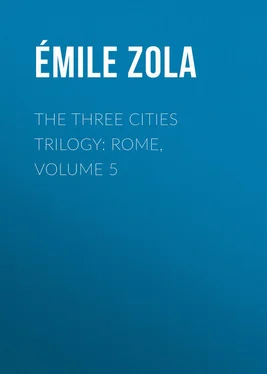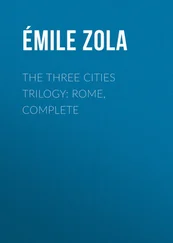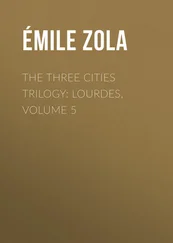Émile Zola - The Three Cities Trilogy - Rome, Volume 5
Здесь есть возможность читать онлайн «Émile Zola - The Three Cities Trilogy - Rome, Volume 5» — ознакомительный отрывок электронной книги совершенно бесплатно, а после прочтения отрывка купить полную версию. В некоторых случаях можно слушать аудио, скачать через торрент в формате fb2 и присутствует краткое содержание. Жанр: literature_19, foreign_antique, foreign_prose, на английском языке. Описание произведения, (предисловие) а так же отзывы посетителей доступны на портале библиотеки ЛибКат.
- Название:The Three Cities Trilogy: Rome, Volume 5
- Автор:
- Жанр:
- Год:неизвестен
- ISBN:нет данных
- Рейтинг книги:3 / 5. Голосов: 1
-
Избранное:Добавить в избранное
- Отзывы:
-
Ваша оценка:
- 60
- 1
- 2
- 3
- 4
- 5
The Three Cities Trilogy: Rome, Volume 5: краткое содержание, описание и аннотация
Предлагаем к чтению аннотацию, описание, краткое содержание или предисловие (зависит от того, что написал сам автор книги «The Three Cities Trilogy: Rome, Volume 5»). Если вы не нашли необходимую информацию о книге — напишите в комментариях, мы постараемся отыскать её.
The Three Cities Trilogy: Rome, Volume 5 — читать онлайн ознакомительный отрывок
Ниже представлен текст книги, разбитый по страницам. Система сохранения места последней прочитанной страницы, позволяет с удобством читать онлайн бесплатно книгу «The Three Cities Trilogy: Rome, Volume 5», без необходимости каждый раз заново искать на чём Вы остановились. Поставьте закладку, и сможете в любой момент перейти на страницу, на которой закончили чтение.
Интервал:
Закладка:
All at once the ebony clock struck nine and the young man felt astonished. What! had only ten minutes elapsed since he had crossed the threshold of the bronze doors below? He felt as if he had been walking on for days and days. Then, desiring to overcome the nervous feeling which oppressed him – for he ever feared lest his enforced calmness should collapse amidst a flood of tears – he began to walk up and down, passing in front of the clock, glancing at the crucifix on the pier table, and the globe of the lamp on which had remained the mark of a servant's greasy fingers. And the light was so faint and yellow that he felt inclined to turn the lamp up, but did not dare. Then he found himself with his brow resting against one of the panes of the window facing the Piazza of St. Peter's, and for a moment he was thunderstruck, for between the imperfectly closed shutters he could see all Rome, as he had seen it one day from the /loggie/ of Raffaelle, and as he had pictured Leo XIII contemplating it from the window of his bed-room. However, it was now Rome by night, Rome spreading out into the depths of the gloom, as limitless as the starry sky. And in that sea of black waves one could only with certainty identify the larger thoroughfares which the white brightness of electric lights turned, as it were, into Milky Ways. All the rest showed but a swarming of little yellow sparks, the crumbs, as it were, of a half-extinguished heaven swept down upon the earth. Occasional constellations of bright stars, tracing mysterious figures, vainly endeavoured to show forth distinctly, but they were submerged, blotted out by the general chaos which suggested the dust of some old planet that had crumbled there, losing its splendour and reduced to mere phosphorescent sand. And how immense was the blackness thus sprinkled with light, how huge the mass of obscurity and mystery into which the Eternal City with its seven and twenty centuries, its ruins, its monuments, its people, its history seemed to have been merged. You could no longer tell where it began or where it ended, whether it spread to the farthest recesses of the gloom, or whether it were so reduced that the sun on rising would illumine but a little pile of ashes.
However, in spite of all Pierre's efforts, his nervous anguish increased each moment, even in presence of that ocean of darkness which displayed such sovereign quiescence. He drew away from the window and quivered from head to foot on hearing a faint footfall and thinking it was that of Signor Squadra approaching to fetch him. The sound came from an adjacent apartment, the little throne-room, whose door, he now perceived, had remained ajar. And at last, as he heard nothing further, he yielded to his feverish impatience and peeped into this room which he found to be fairly spacious, again hung with red damask, and containing a gilded arm-chair, covered with red velvet under a canopy of the same material. And again there was the inevitable pier table, with a tall ivory crucifix, a clock, a pair of lamps, a pair of candelabra, a pair of large vases on pedestals, and two smaller ones of Sevres manufacture decorated with the Holy Father's portrait. At the same time, however, the room displayed rather more comfort, for a Smyrna carpet covered the whole of the marble floor, while a few arm-chairs stood against the walls, and an imitation chimney-piece, draped with damask, served as counterpart to the pier table. As a rule the Pope, whose bed-chamber communicated with this little throne-room, received in the latter such persons as he desired to honour. And Pierre's shiver became more pronounced at the idea that in all likelihood he would merely have the throne-room to cross and that Leo XIII was yonder behind its farther door. Why was he kept waiting, he wondered? He had been told of mysterious audiences granted at a similar hour to personages who had been received in similar silent fashion, great personages whose names were only mentioned in the lowest whispers. With regard to himself no doubt, it was because he was considered compromising that there was a desire to receive him in this manner unknown to the personages of the Court, and so as to speak with him at ease. Then, all at once, he understood the cause of the noise he had recently heard, for beside the lamp on the pier table of the little throne-room he saw a kind of butler's tray containing some soiled plates, knives, forks, and spoons, with a bottle and a glass, which had evidently just been removed from a supper table. And he realised that Signor Squadra, having seen these things in the Pope's room, had brought them there, and had then gone in again, perhaps to tidy up. He knew also of the Pope's frugality, how he took his meals all alone at a little round table, everything being brought to him in that tray, a plate of meat, a plate of vegetables, a little Bordeaux claret as prescribed by his doctor, and a large allowance of beef broth of which he was very fond. In the same way as others might offer a cup of tea, he was wont to offer cups of broth to the old cardinals his friends and favourites, quite an invigorating little treat which these old bachelors much enjoyed. And, O ye orgies of Alexander VI, ye banquets and /galas/ of Julius II and Leo X, only eight /lire/ a day – six shillings and fourpence – were allowed to defray the cost of Leo XIII's table! However, just as that recollection occurred to Pierre, he again heard a slight noise, this time in his Holiness's bed-chamber, and thereupon, terrified by his indiscretion, he hastened to withdraw from the entrance of the throne-room which, lifeless and quiescent though it was, seemed in his agitation to flare as with sudden fire.
Then, quivering too violently to be able to remain still, he began to walk up and down the ante-chamber. He remembered that Narcisse had spoken to him of that Signor Squadra, his Holiness's cherished valet, whose importance and influence were so great. He alone, on reception days, was able to prevail on the Pope to don a clean cassock if the one he was wearing happened to be soiled by snuff. And though his Holiness stubbornly shut himself up alone in his bed-room every night from a spirit of independence, which some called the anxiety of a miser determined to sleep alone with his treasure, Signor Squadra at all events occupied an adjoining chamber, and was ever on the watch, ready to respond to the faintest call. Again, it was he who respectfully intervened whenever his Holiness sat up too late or worked too long. But on this point it was difficult to induce the Pope to listen to reason. During his hours of insomnia he would often rise and send Squadra to fetch a secretary in order that he might detail some memoranda or sketch out an encyclical letter. When the drafting of one of the latter impassioned him he would have spent days and nights over it, just as formerly, when claiming proficiency in Latin verse, he had often let the dawn surprise him whilst he was polishing a line. But, indeed, he slept very little, his brain ever being at work, ever scheming out the realisation of some former ideas. His memory alone seemed to have slightly weakened during recent times.
Pierre, as he slowly paced to and fro, gradually became absorbed in his thoughts of that lofty and sovereign personality. From the petty details of the Pope's daily existence, he passed to his intellectual life, to the /role/ which he was certainly bent on playing as a great pontiff. And Pierre asked himself which of his two hundred and fifty-seven predecessors, the long line of saints and criminals, men of mediocrity and men of genius, he most desired to resemble. Was it one of the first humble popes, those who followed on during the first three centuries, mere heads of burial guilds, fraternal pastors of the Christian community? Was it Pope Damasus, the first great builder, the man of letters who took delight in intellectual matters, the ardent believer who is said to have opened the Catacombs to the piety of the faithful? Was it Leo III, who by crowning Charlemagne boldly consummated the rupture with the schismatic East and conveyed the Empire to the West by the all-powerful will of God and His Church, which thenceforth disposed of the crowns of monarchs? Was it the terrible Gregory VII, the purifier of the temple, the sovereign of kings; was it Innocent III or Boniface VIII, those masters of souls, nations, and thrones, who, armed with the fierce weapon of excommunication, reigned with such despotism over the terrified middle ages that Catholicism was never nearer the attainment of its dream of universal dominion? Was it Urban II or Gregory IX or another of those popes in whom flared the red Crusading passion which urged the nations on to the conquest of the unknown and the divine? Was it Alexander III, who defended the Holy See against the Empire, and at last conquered and set his foot on the neck of Frederick Barbarossa? Was it, long after the sorrows of Avignon, Julius II, who wore the cuirass and once more strengthened the political power of the papacy? Was it Leo X, the pompous, glorious patron of the Renascence, of a whole great century of art, whose mind, however, was possessed of so little penetration and foresight that he looked on Luther as a mere rebellious monk? Was it Pius V, who personified dark and avenging reaction, the fire of the stakes that punished the heretic world? Was it some other of the popes who reigned after the Council of Trent with faith absolute, belief re-established in its full integrity, the Church saved by pride and the stubborn upholding of every dogma? Or was it a pope of the decline, such as Benedict XIV, the man of vast intelligence, the learned theologian who, as his hands were tied, and he could not dispose of the kingdoms of the world, spent a worthy life in regulating the affairs of heaven?
Читать дальшеИнтервал:
Закладка:
Похожие книги на «The Three Cities Trilogy: Rome, Volume 5»
Представляем Вашему вниманию похожие книги на «The Three Cities Trilogy: Rome, Volume 5» списком для выбора. Мы отобрали схожую по названию и смыслу литературу в надежде предоставить читателям больше вариантов отыскать новые, интересные, ещё непрочитанные произведения.
Обсуждение, отзывы о книге «The Three Cities Trilogy: Rome, Volume 5» и просто собственные мнения читателей. Оставьте ваши комментарии, напишите, что Вы думаете о произведении, его смысле или главных героях. Укажите что конкретно понравилось, а что нет, и почему Вы так считаете.












